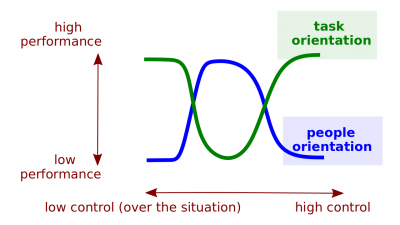Fiedler contingency model
Fiedler contingency model (hereinafter, the Model) is a model that suggests that effective group performance depends on the proper match between a leader's orientation, whether he or she is task-oriented or people-oriented, and the degree to which the situation allows the leader to control and influence. The model (1) uses a least preferred coworker questionnaire to classify leaders, (2) assumes that leaders cannot be both task-oriented or people-oriented, and (3) suggests that people orientation is the best match to the situations with moderate control, while those leaders who are task-oriented best perform in situations with high or low control.
Definitions
According to Organizational Behavior by Robbins and Judge (17th edition),
- Fiedler contingency model. The theory that effective groups depend on a proper match between a leader's style of interacting with subordinates and the degree to which the situation gives control and influence to the leader.
According to Management by Robbins and Coulter (14th edition),
- Fiedler contingency model. A leadership theory proposing that effective group performance depends on the proper match between a leader's style and the degree to which the situation allows the leader to control and influence.
Related concepts
- Least preferred coworker questionnaire. An instrument that purports to measure whether a person is task or relationship oriented. The questionnaire has initially been developed for the Fiedler contingency model.
